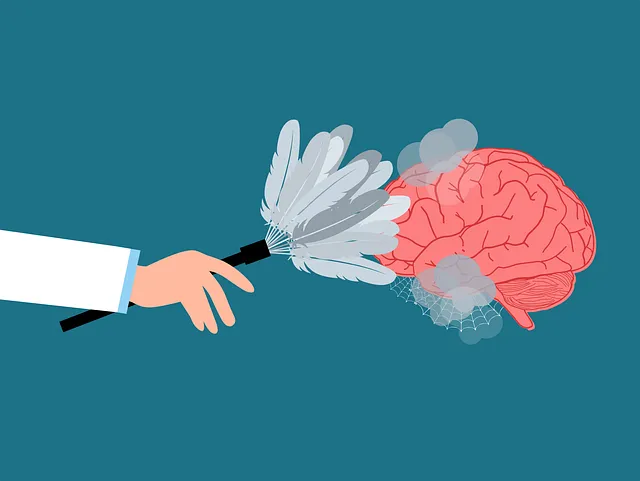Risk management planning is a critical strategy for enhancing Superior Kaiser Permanente mental health services, focusing on patient safety and provider well-being. It involves proactively identifying and mitigating risks through self-awareness exercises, compassion cultivation, evidence-based training, and sophisticated communication. This approach addresses internal factors like staff workload and external elements such as regulatory changes, technological gaps, and cultural sensitivities. By implementing stress management techniques, educational programs, and tailored conflict resolution strategies, Kaiser Permanente ensures resilience among professionals, leading to consistent, high-quality care while fostering culturally responsive services. Regular review of the risk management plan is essential to adapt to evolving circumstances and emerging challenges, ensuring superior patient outcomes.
Mental health professionals face unique challenges, necessitating robust risk management planning. This comprehensive guide explores essential strategies for navigating potential risks and hazards within clinical settings, inspired by the exemplary practices of Kaiser Permanente Mental Health Services. We delve into understanding risk management’s cornerstone, identifying specific threats, and developing tailored mitigation plans. Furthermore, we detail implementation and review processes, ensuring continuous improvement in patient safety and care quality. Discover how these steps contribute to delivering superior Kaiser Permanente mental health services.
- Understanding Risk Management in Mental Health Care
- Identifying Potential Risks and Hazards
- Developing Effective Strategies for Mitigation
- Implementing and Reviewing the Risk Management Plan (Kaiser Permanente Mental Health Services)
Understanding Risk Management in Mental Health Care

In the realm of mental health care, risk management planning is a cornerstone of delivering superior Kaiser Permanente mental health services. It involves a comprehensive approach to anticipate, assess, and mitigate potential risks that professionals may encounter in their daily practice. This proactive strategy ensures the safety and well-being of both patients and providers, fostering an environment conducive to effective therapy. By integrating self-awareness exercises and compassion cultivation practices into routine care, mental health professionals can enhance their resilience and reduce the risk of burnout, a prevalent concern in this demanding field.
Effective risk management requires a nuanced understanding of the unique challenges faced by mental health workers, including managing complex cases, dealing with trauma, and maintaining professional boundaries. It involves regular self-reflection, ongoing training in evidence-based practices, and clear communication strategies to navigate sensitive situations. Through these measures, mental health professionals can not only protect themselves but also optimize patient outcomes, ensuring a more sustainable and compassionate approach to care.
Identifying Potential Risks and Hazards

Identifying potential risks is a crucial step in risk management planning for mental health professionals. This process involves a thorough examination of various factors that could negatively impact service delivery and patient outcomes at Kaiser Permanente’s superior mental health services. It encompasses not only internal elements like staff workload, resource allocation, and clinical protocols but also external factors such as regulatory changes, societal attitudes towards mental health, and technological advancements or gaps in care. By proactively assessing these risks, mental health professionals can better prepare to mitigate their effects.
One specific area of focus should be on patient-related risks, including the potential for self-harm or harm to others, especially during periods of heightened stress or crisis. Additionally, recognizing the impact of burnout and secondary trauma on healthcare providers is essential. Incorporating stress management techniques, such as Mental Wellness Journaling Exercises, and designing comprehensive Mental Health Education Programs can help build resilience among staff. These proactive measures not only enhance the overall well-being of mental health professionals but also contribute to the delivery of consistent and high-quality care at Kaiser Permanente.
Developing Effective Strategies for Mitigation

Mental health professionals face a unique set of challenges that require thoughtful risk management planning. Developing effective strategies for mitigation is crucial to ensuring superior Kaiser Permanente mental health services, fostering a safe and supportive environment for both clients and practitioners. One key aspect is equipping professionals with robust coping skills development programs, enabling them to navigate their own emotional demands while providing compassionate care.
Additionally, cultural sensitivity in mental healthcare practice plays a significant role in risk management. By embracing conflict resolution techniques tailored to diverse cultural backgrounds, professionals can address potential misunderstandings or tensions, enhancing the overall therapeutic experience. These strategies not only mitigate risks but also empower mental health workers to deliver exceptional, culturally responsive services, reflecting the commitment to superior care within Kaiser Permanente.
Implementing and Reviewing the Risk Management Plan (Kaiser Permanente Mental Health Services)

Implementing a robust risk management plan is an integral part of providing superior Kaiser Permanente mental health services. This process involves identifying potential risks and hazards specific to the professional’s practice, developing strategies to mitigate these risks, and regularly reviewing and updating the plan to ensure its effectiveness. By adopting this proactive approach, mental health professionals can create a safer, more supportive environment for both themselves and their clients.
Regular review sessions are crucial to adapt to evolving circumstances and emerging challenges in the field. During these reviews, practitioners should assess the success of implemented strategies, consider new research or best practices related to self-esteem improvement, conflict resolution techniques, and emotional intelligence, and make necessary adjustments to enhance patient care and overall practice resilience.
Risk management planning is an indispensable tool for mental health professionals, ensuring they can provide superior Kaiser Permanente mental health services. By understanding potential risks, identifying hazards, and developing effective mitigation strategies, practitioners can create a safe and supportive environment for both patients and themselves. The successful implementation and periodic review of these plans, as exemplified by Kaiser Permanente Mental Health Services, allow for continuous improvement and better management of crises, ultimately enhancing the quality of care delivered.






